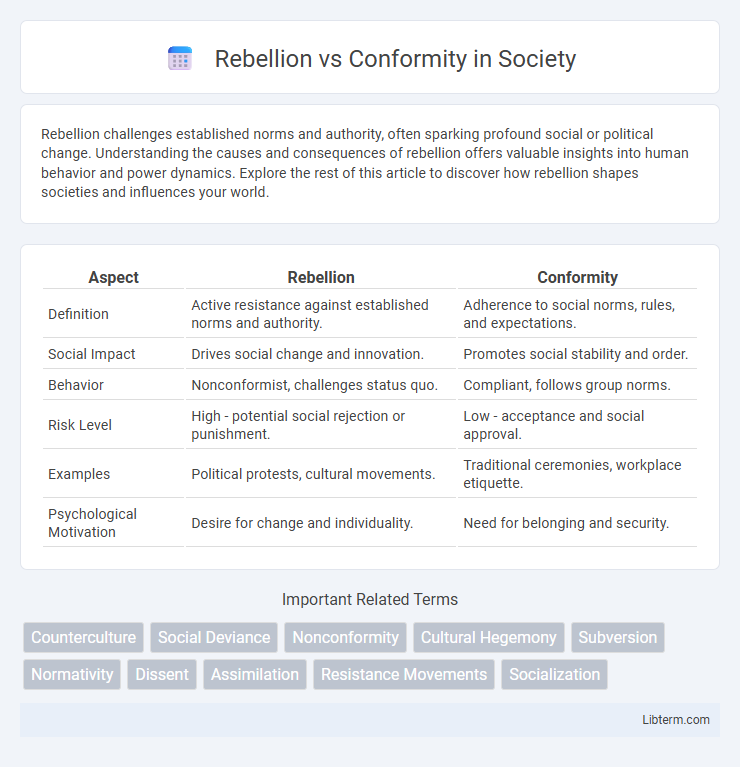Rebellion challenges established norms and authority, often sparking profound social or political change. Understanding the causes and consequences of rebellion offers valuable insights into human behavior and power dynamics. Explore the rest of this article to discover how rebellion shapes societies and influences your world.
Table of Comparison
| Aspect | Rebellion | Conformity |
|---|---|---|
| Definition | Active resistance against established norms and authority. | Adherence to social norms, rules, and expectations. |
| Social Impact | Drives social change and innovation. | Promotes social stability and order. |
| Behavior | Nonconformist, challenges status quo. | Compliant, follows group norms. |
| Risk Level | High - potential social rejection or punishment. | Low - acceptance and social approval. |
| Examples | Political protests, cultural movements. | Traditional ceremonies, workplace etiquette. |
| Psychological Motivation | Desire for change and individuality. | Need for belonging and security. |
Understanding Rebellion and Conformity
Rebellion emerges as a deliberate challenge to societal norms, driven by the desire for individuality and change, while conformity involves aligning with group expectations to maintain social harmony and acceptance. Understanding rebellion requires analyzing the motivations behind resisting authority, which often stem from perceived injustice or the pursuit of personal freedom. Conformity, on the other hand, can be seen as a social mechanism that provides stability and cohesion by encouraging behaviors that reflect collective values and norms.
Historical Perspectives on Rebellion
Historical perspectives on rebellion reveal it as a catalyst for social and political transformation, seen in revolutions like the American and French Revolutions that challenged monarchic and colonial authority. Rebellions often emerged from systemic injustices and oppressive governance, exemplified by the 19th-century slave revolts and peasant uprisings that questioned established hierarchies. These movements underscore the enduring tension between individual or collective dissent and societal conformity throughout history.
The Psychology Behind Conformity
The psychology behind conformity involves social influence where individuals adjust their behaviors, beliefs, or attitudes to align with group norms, often driven by the fundamental human need for acceptance and fear of social rejection. Studies in social psychology, such as Solomon Asch's conformity experiments, demonstrate how normative social influence and informational social influence compel people to conform even against their own judgment. Neuropsychological research reveals that conformity activates brain regions associated with reward and social pain, highlighting its deep-rooted cognitive and emotional mechanisms.
Social Impacts of Nonconformity
Nonconformity challenges societal norms, often sparking social change by encouraging diversity of thought and innovation. It can lead to social alienation or marginalization for individuals who resist conformity, impacting community cohesion and social dynamics. Nonconformist movements historically influence cultural evolution by promoting critical examination of established practices and inspiring reform.
Cultural Influences on Rebellious Behavior
Cultural influences play a significant role in shaping rebellious behavior by establishing norms that individuals either accept or challenge. Societies with rigid traditions and strict social hierarchies often provoke stronger acts of rebellion as people seek personal identity and freedom. Cross-cultural studies show that collectivist cultures tend to suppress overt rebellion, while individualistic cultures encourage self-expression and dissent.
Rebellion vs Conformity in Adolescence
Adolescence marks a critical period where rebellion often challenges societal norms as teens seek identity and autonomy. Resistance to conformity enables adolescents to explore personal values, develop critical thinking, and establish individuality. Balancing rebellion and conformity during this stage influences social integration and psychological resilience into adulthood.
The Role of Authority and Individuality
Authority often enforces conformity by establishing norms and rules that individuals are expected to follow, limiting personal freedom and expression. Rebellion emerges as a response to this control, driven by a desire to assert individuality and challenge existing power structures. The dynamic interplay between authority and individuality highlights the tension between societal order and personal autonomy, shaping cultural and social evolution.
Benefits and Risks of Conformity
Conformity fosters social harmony and facilitates group cohesion by encouraging individuals to align with shared norms and values, which can enhance cooperation and reduce conflict. However, excessive conformity risks suppressing creativity, critical thinking, and personal authenticity, potentially leading to groupthink and stagnation. Balancing conformity with individuality is essential to maintain both social order and innovation.
Famous Rebels Who Changed Society
Famous rebels like Rosa Parks, Mahatma Gandhi, and Martin Luther King Jr. challenged societal norms through acts of civil disobedience that sparked significant social and political change. These figures rejected conformity by advocating for racial equality, independence, and human rights, inspiring movements that reshaped laws and cultural attitudes worldwide. Their legacies demonstrate the power of individual courage in transforming entrenched systems of oppression.
Finding Balance: Healthy Rebellion and Social Harmony
Healthy rebellion serves as a catalyst for personal growth and societal progress by challenging outdated norms without fostering chaos or division. Embracing constructive dissent encourages critical thinking and innovation while maintaining respect for social harmony and communal values. Achieving a balance between rebellion and conformity enables individuals to advocate for change responsibly, promoting both individual authenticity and cohesive social functioning.
Rebellion Infographic

 libterm.com
libterm.com